|
|
|
Sort Order |
|
|
|
Items / Page
|
|
|
|
|
|
|
| Srl | Item |
| 1 |
ID:
149520
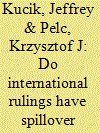

|
|
|
|
|
| Summary/Abstract |
How influential are international courts? Can their rulings reach beyond a given case and affect the behavior of countries not party to the dispute? International law is clear on the matter: rulings have no formal authority beyond the case at hand. This tenet is consistent with the incentives of sovereign states wary of delegating too much authority to courts. By contrast, the authors claim that even in the absence of formal authority, the rulings of international courts can affect behavior by mobilizing pro-compliance groups in countries not party to a dispute. They test these beliefs in the context of the World Trade Organization (WTO) through a novel approach. Because WTO rulings have implications for the fortunes of publicly traded firms, they examine whether financial markets bet on there being spillover effects beyond the case at hand. They rely on two quantitative case studies to test for a cross-border and a cross-industry spillover effect: can rulings have effects in countries and on industries other than those at issue in the initial dispute? The results suggest that the answer is a tentative yes. The spillover effects of international rulings may be a matter of scholarly contention, but their existence is something that financial markets appear willing to bet on.
|
|
|
|
|
|
|
|
|
|
|
|
|
|
|
|
| 2 |
ID:
149517
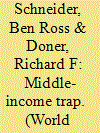

|
|
|
|
|
| Summary/Abstract |
Economists have identified the existence of a middle-income (MI) trap but have yet to analyze the politics of this trap. The authors argue that countries in the MI trap face two major institutional and political challenges. First, the policies necessary to upgrade productivity—as in human capital and innovation—require enormous investment in institutional capacity. Second, these institutional challenges come at a time when political capacity for building these institutions is weak, due primarily to the fragmentation of potential support coalitions. Politics are stalled in particular by fractured social groups, especially business and labor, and more generally by inequality. These conditions result in large measure from previous trajectories of growth. The empirical analysis concentrates on nine of the larger MI countries.
|
|
|
|
|
|
|
|
|
|
|
|
|
|
|
|
| 3 |
ID:
149518
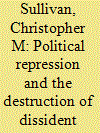

|
|
|
|
|
| Summary/Abstract |
How does repression influence overt, collective challenges directed against political authority? To date, answers to this question have been inconclusive. This article argues that recent works inadequately address the topic because the focus has been on repression's impact on local civilians, with less consideration of dissident organizations. The author develops an organizational theory of challenger development and specifies predictions for how repression's effects on dissent are contingent upon the types of organizational behaviors targeted for coercion. The analysis employs original, microlevel data collected from previously confidential Guatemalan National Police records to assess the effects of repression during the years 1975 to 1985. Results show that the effects of repression are more complex than previously imagined. When repression targets the clandestine activities necessary to develop and sustain dissident organizations, such as holding meetings, training participants, and campaigning for funds, dissent declines significantly. But when repression is directed at ongoing, overt, collective challenges, it motivates a backlash that escalates dissent. Implications are drawn for how political order and conflict are understood and studied.
|
|
|
|
|
|
|
|
|
|
|
|
|
|
|
|
| 4 |
ID:
149519
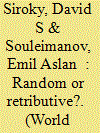

|
|
|
|
|
| Summary/Abstract |
This article provides a critical examination of the current theoretical debate concerning the effects of indiscriminate violence. It argues that indiscriminate violence has been treated as an essentially random counterinsurgency tactic, but that the important distinction between its random and retributive variations has been overlooked, along with critical issues of timing and location, which has made it difficult to evaluate its efficacy in quelling rebel violence. Prior research has shown that both random and retributive violence reduced insurgent activity in the targeted locations and in the short term, but it does not necessarily follow that indiscriminate violence is effective. This article uses microlevel ethnographic evidence from Chechen villages during the period from 2001 to 2005 to show that indiscriminate violence deployed retributively against village communities generated insurgent activity in other areas because local avengers and rebels from the targeted populations sought to avoid further retributive violence against their village communities. Moreover, the insurgent activity occurred at least nine months after the initial act of retributive violence. Indiscriminate violence deployed randomly against village communities generated insurgent activity within the same targeted area, since the insurgents did not fear retributive violence in retaliation, and occurred with a delay of at least six months. As a result, the rebel reaction to indiscriminate violence is not observed immediately or, in the case of retributive violence, in the same location. This finding has crucial implications for evaluating the efficacy of indiscriminate violence in counterinsurgency operations, and underscores the importance of understanding how the social and political context can shape the way populations react to different forms of violence.
|
|
|
|
|
|
|
|
|
|
|
|
|
|
|
|
| 5 |
ID:
149516
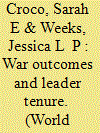

|
|
|
|
|
| Summary/Abstract |
A growing body of literature argues that war outcomes affect leaders’ tenure in office. But disagreement persists over how domestic political institutions translate performance in war into leader accountability. Some scholars argue that the tenure of democratic leaders is most sensitive to war outcomes, while others posit that autocratic leaders are more likely to be punished or rewarded for the outcomes of conflicts. The authors argue that existing research fails to take into account two important factors: whether the leader is viewed as culpable for the country's entry into the conflict, and whether the country features domestic institutions that make the leader vulnerable to removal from office, which varies greatly across nondemocracies. After taking leaders’ culpability and vulnerability into account, the authors show that the tenures of culpable, democratic leaders and culpable, vulnerable, nondemocratic leaders are sensitive to war outcomes. By contrast, the tenures of nondemocratic leaders who are less vulnerable to removal are not sensitive to war outcomes, regardless of their culpability.
|
|
|
|
|
|
|
|
|
|
|
|
|
|
|
|
|
|
|
|
|